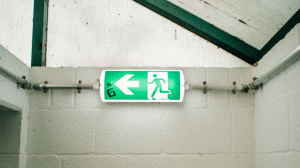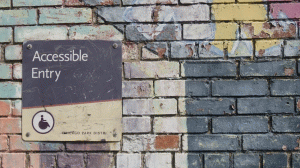A few years ago, my son had a water gun stolen from our backyard. It was one of those larger, more expensive ones with a water tank and wide spray capability. Of course, I was mad at first and wanted to find out which of the neighborhood kids took it. And then a thought struck me: My son had three of these water guns. We had recently bought him two (so he could have water fights with a friend) and coincidentally, he got another one for his birthday at the same time. And I couldn't deny it: no kid needs three water guns all to himself. There was no denying: The fact that the neighbor's child - who probably didn't have one himself - took one from our backyard simply had something to do with redistribution.
What is considered criminal or punishable in our society has to do with who has the power of definition for criminal/punishable/illegal behavior. And there we are dealing with nothing less than the power of the state, which is so dangerous in its massive superiority that it is (theoretically) divided by the democratic principle of separation of powers, so that they (theoretically) control and limit each other: the legislative power (parliaments), the executive power (cops, among others) and the law-speaking power (courts). And it also has to do with power how harshly or leniently criminal behavior is punished and also which unlawful how strictly certain behavior is prosecuted or at which points people in charge choose to look the other way. And that is why it is primarily marginalized people who are in prison: If they break the law, they are sentenced more often and for longer and are released early less often than privileged people.
I think most people find it pretty clear what is theft and what is not. Taking a water pistol that belongs to another kid? Theft. Discreetly pocketing things from a store without paying for them? Theft! And you know what we don't commonly call theft?
- Unpaid overtime!
- The gender pay gap!
- The hourly wage of € 1.35 in the so-called workshops for the disabled and the hourly wage of 1-3 euros for prison inmates!
- Different wages for the same work due to the different educational qualifications of the employees!
- Work breaks that are not made possible, vacation days that are forfeited!
The discourse in the English language area is again further than the German one and has for it a designation: Wage Theft.
What Wage Theft means is made clear by a particularly perfidious and cynical example: when Amazon CEO and billionaire Jeff Bezoz climbed into his rocket last year to fly into space, he thanked his employees, among others: "You paid for all this!" It's only possible that Jeff Bezoz has money for a space trip because that very money is missing from the accounts of his poorly paid employees. Electricity doesn't come out of an outlet and money doesn't come out of an ATM - and rich people are rich because they deprive the people who work for them of a decent wage.
Sure, we unanimously think that's uncool, and our orders at Amazon have been even more weighed down by shopping shame ever since. And we’re generally not very fond of other super-rich people either. But even if many now agree that billionaires and multiple millionaires should not exist, capitalism has long since corrupted our view, our values. And so it happens that across all political camps we populistically speak of "clan criminality" when we place Brown men under general suspicion - but, for example, we do not call the machinations of the Quandt/Klatten clan, one of the richest families in Germany, by that name. This autochthonous German clan was able to accumulate its unimaginably immense wealth at all, because they were already war profiteers in the First World War, exploited forced laborers in factory-owned concentration camps in the Second World War, participated in the expropriation of Jewish companies and supplied the war as arms manufacturers. Today, the Quandt clan is co-owner of BMW - and only two years ago, a report appeared according to which Uyghurs - a Muslim, persecuted and oppressed Chinese ethnic group - perform forced labor in BMW supplier factories. The Quandt clan is rich because the people who have worked and continue to work for them (repeatedly involuntarily over the decades) at the lowest links in the supply chain remain poor.
In capitalism, it is so normalized to pay people as little as possible that fair working conditions tend to be the exception in our consumer goods. And the normalization of these circumstances actually has something to do with brutalization, corrupting our values and our judgments. We measure the world with different yardsticks, and it's all interrelated. It affects not only our narratives on the individual or societal level, but also on the institutional level - because not everyone is equal before the law.
When the infamous former feminist Alice Schwarzer had to reckon with her secret Swiss black money account being exposed, she quickly turned herself in and paid 200,000 euros in back taxes. Decriminalizing oneself by self-disclosure is a privilege protected by law that is exclusively available to tax evaders: they remain unpunished if they turn themselves in and pay the tax debt in arrears. Back to immaculate righteousness!
For Hartz4 recipients who cheat on their statements in hope for a few meager Euros more, the law does not provide such a possibility for exemption from punishment and, as is well known, neither society nor the judiciary can take a joke when it comes to Hartz4 "fraud". A less strict legal situation and interpretation wouldn’t help those who get Hartz4 much, because where should they get the financial means to pay fines? And so another delicacy of our classist justice system comes into play: the substitute custodial sentence. If you are sentenced to a fine and cannot pay it, you end up in prison! Isn't it ultra embarrassing that we need civil initiatives like Freiheitsfonds that work donations-based to "buy" people out of prisons who are sitting there because they can't afford public transport tickets or the fine for doing so if they get caught?! Meanwhile, high-profile white-collar criminals convicted of corruption, are allowed to pay their multi-million dollar fines out of the company's coffers completely legally - which the company can then even deduct from its taxes!
For neurodivergent reasons, I am not so compatible with conventions, rules or authorities, so I have never been a fan of judicial or let alone executive power - or of the principle of punishment in the first place, even on the individual/parental/societal level. I am firmly convinced: prisons should be abolished. I see foundations and strategies for this, for example, in Nonviolent Communication and Transformative Justice. But I also learned a lot about our illogical and undercomplex understanding of crime and righteousness from the South African presenter and comedian Trevor Noah: In his autobiography "Born A Crime" he tells in a highly entertaining way about his childhood and youth in segregated South Africa, which was marked by extreme poverty. As the son of a Black Xhosa and a White Swiss, his birth was already a crime, since such a union was forbidden by law at the time. And at one point Noah tells about the logic, which is completely understandable to me, according to which it did not feel like an injustice for him and his friends, who also lived in poverty, to take things from wealthy people without asking for it, for which the previous owners aare compensated (!) by an insurance company.
I guess most people think that the neighbor's child who took that water pistol from our garden should be punished (however) or face "logical consequences" (which in reality are often simply punishments). But I somehow think: My son and I are the ones who have experienced a perfectly understandable consequence of the fact that we live in a society where resources are distributed unfairly - and not because our system is just malfunctioning, but because our system is designed for resources to be distributed hierarchically. We cannot expect people who are disadvantaged by this to simply accept this fact. The neighbor's child could not trust that the water pistols of this world would be distributed equitably, nor was he willing to accept remaining water pistol-less. He had to take the charge for it into his own hands. I respect that.
In general, I think a lot of self-responsibility, because you just can't rely on the law. And so, with the Pay Transparency Act, the German government has pretended that it wants to make a contribution to combating the gender pay gap. But the law exists more on paper and has no actual consequences for companies that pay women and men unequally for the same work. That's why it's important to check with your company. Wage theft is as immoral as it is real, and it almost certainly happens at your company.
I have already written about this: We do not pay for work according to neutral, reasonable standards. Instead, we pay them according to ideological standards. Of course, this does not correspond to our self-image, but let's face it: We do not pay disabled people in so-called sheltered workshops € 1.35 hourly "wages" because their work would actually have so little equivalent value in our supply chain. Rather, we pay this embarrassing, inhumane amount because we simply can. Our ableist ideology of drastically devaluing the work of disabled people allows us to normalize our capitalist ideology of paying people in the lower links of the supply chain as little as humanly possible, setting wages accordingly and allocating resources.
Please start naming the various stolen wages in your company, and talking about whose pockets the embezzled wages end up in, and whose pockets are missing them. And then please start with the redistribution.
With this text I say goodbye as a columnist at tbd* - my year at this place is now over. It was a feast for me! I am now back to focusing on my work as a racism awareness trainer. See you soon!
In this column, presented in collaboration with our friends from Wildling Shoes, we want to give more space and visibility to the issues of anti-discrimination, belonging, and intersectionality in the workplace. Through articles, interviews, and diverse perspectives, we aim to both challenge and inspire those working in the impact sector - while encouraging them to create authentically lived workspaces that foster more belonging and less discrimination. By gaining new perspectives and engaging in a shared dialogue, we can take a collective step toward radical systems change in the impact sector - from "power over" and "power for" to "power with."
Our columnist for 2022 is Sohra Behmanesh. She lives with her family in Berlin, works as a freelance anti-racism trainer, and finds caring and empathy just as superb as intersectionality.
You can find more Belonging articles here.

Photo: Kris Wolf










